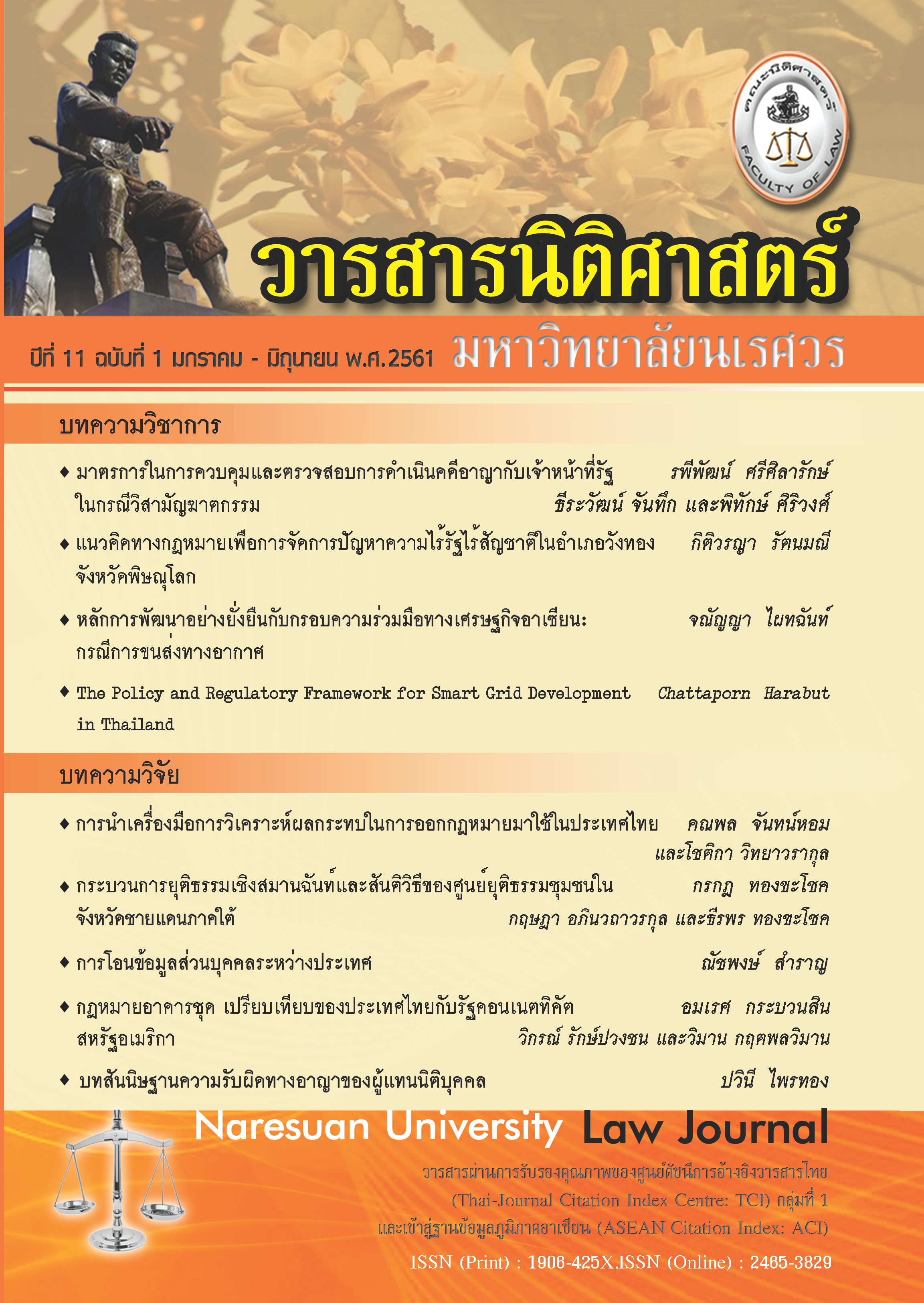The Policy and Regulatory Framework for Smart Grid Development in Thailand
Main Article Content
Abstract
Electric system is facing a period of rapid evolution. The current regulation of natural monopolies does not offer sufficient way for network operators and network users to participate in this process. The deployment of smart grids in electricity network which amalgamates information and communications technology (‘ICT’) and electrical capabilities is seen as an additional instrument to achieve goals for improving flexibility, security, reliability, efficiency and the safety of the electricity system as well as combating climate change. This paper draws on the issue of the policy and regulatory framework for smart grid development in Thailand. This paper applies analytical, theoretical and doctrinal legal study approaches to evaluate how policy and regulation are designed and applied in other country to analyze an appropriate regulatory pathway to deliver solutions for smart grid development in Thailand. It is argued that the effectiveness of a policy and regulation for smart grid development relies on how well it is designed and enforces.
Article Details
References
Chacrit Sitdhiwej. “Renewable Energy Law and Policy in Thailand.” Renewable Energy Law and Policy Review 7, no. 2 (2016): 184-189.
Clastre, Cédric. “Smart Grids: Another Step towards Competition, Energy Security and Climate Change Objectives.” Energy Policy 39, (2011): 5399-5408.
Department of Alternative Energy Development and Efficiency. “Alternative Energy Development Plan: AEDP 2015.” Last modified 2015. Accessed November 15, 2017. www.dede.go.th/download/files/AEDP2015_ Final_version.pdf.
Department of Resources, Energy and Tourism. “National Framework for Energy Efficiency.” Last modified n.d. Accessed February 18, 2010. https://www.ret.gov.aulDocuments/mce/energy-eff/nfee/default.html.
Department of Resources. “Energy and Tourism, Renewable and Distributed Generation.” Last modified n.d. Accessed 10 December 10, 2016. https://www.ret.gov.au/Documents/mce/rdg/default.html.
Department of the Environment. Smart Grid Smart City: A New Direction for a New Energy Era Water, Heritage and the Arts. Australia: Department of the Environment, 2009.
Energy Policy and Planning Office (EPPO). “Energy Economic Statistics.” Last modified n.d. Accessed January 10, 2018. https://www.eppo.go.th/index.php/en/en- energystatistics/energy-economy-static?orders[publishUp]=publishUp&issearch=1.
Energy Policy and Planning Office (EPPO). “Energy Situation in Year 2015 and Trend in Year 2016.” Last modified March 31, 2016. Accessed January 10, 2018. https://www.eppo.go.th/index.php/en/energy-information-services/energy-situation/energy-situation-in-year-2015-and-trend-in-year-2016.
Energy Policy and Planning Office (EPPO). Thailand Smart Grid Master Plan 2015-2036. Bangkok: Ministry of Energy, 2015. [In Thai]
Essential Services Commission. Guidance Paper: Methodology for Assessment of Fair and Reasonable Feed-In Tariffs and Terms and Conditions. Melbourne Victoria: Essential Services Commission, 2008.
Faerbera, Laura Antonia, Nazmiye Balta-Ozkanb, and Peter M. Connorc. “Innovative Network Pricing to Support the Transition to a smart Grid in a Low Carbon Economy.” Energy Policy 118, (2018): 210-219.
Federal Ministry of Economic Affairs and Energy. Thailand Renewable Energy Policy Update 01/2017. Germany: Federal Ministry of Economic Affairs and Energy, 2017.
Federal Ministry of Economic Affairs and Energy. Thailand Renewable Energy Policy Update: New Power Development Plan announced in May (Status May 2015). Germany: Federal Ministry of Economic Affairs and Energy, 2015.
Güngör, Vehbi C., Dilan Sahin, Taskin Kocak, Salih Ergüt, and Concettina Buccella. “Smart Grid Technologies: Communication Technologies and Standards.” IEEE Transactions on Industrial Informatics 7, no.4 (2011): 529-538.
Haidar, M.A. Ahmed, Kashem Muttaqi and Danny Sutanto. “Smart Grid and Its Future Perspectives in Australia.” Renewable and Sustainable Energy Reviews 51, (2015): 1375-1389.
International Electrotechnical Commission (IEC). “What is a Smart Grid?.” Last modified n.d. Accessed January 15, 2018. https://www.iec.ch/smartgrid/ background/explained.htm.International Energy Agency (IEA). Technology Roadmap: Smart Grids. Paris: IEA, 2011.
International Energy Agency. Energy Technology Perspectives: Scenarios and Strategies for 2050. Paris: Organisation for Economic Co-operation and Development, 2008.
International Energy Agency. Thailand Electricity Security Assessment 2016. Bangkok: International Energy Agency, 2016.
International Renewable Energy Agency. Renewable Energy Outlook: Thailand. Abu Dhabi: International Renewable Energy Agency, 2017.
Lazar, Jason, and McKenzie Mark. Australian Standards for Smart Grids – Standards Roadmap. Canberra: Australian Government, Department of Recourses, Energy and Tourism, 2012.
Lyster, Rosemary. “Smart Grids: Opportunities for Climate Change Mitigation and Adaptation.” Monash University Law Review 36, no.1 (2010): 173-191.
Lyster, Rosemary. “Smart Grids: Opportunities for Climate Change Mitigation and Adaptation.” Monash University Law Review 36, no.1 (2010): 173-191.
M. A., Ahmed Haidar, Kashem Muttaqi and Danny Sutanto. “Smart Grid and Its Future Perspectives in Australia.” Renewable and Sustainable Energy Reviews 51, (2015): 1375-1389.
M.G., Pollitt. “The Future of Electricity (and Gas) Regulation in a Low-Carbon Policy World.” The Energy Journal 29, (2008): 63–94.
Ministerial Council on Energy Standing Committee of Officials. Renewable and Distributed Generation Working Group, Impediments to the Uptake of Renewable and Distributed Energy: Discussion Paper. Australia: Ministerial Council on Energy Standing Committee of Officials, 2006.
Ministerial Council on Energy. Towards a Truly National and Efficient Energy Market(Final Report). Australian: Council of Australian Governments’ Independent Review of Energy Market Directions, 2002.
Napaporn Phuangpornpitak, and Suvit Tia, “Opportunities and Challenges of Integrating Renewable Energy in Smart Grid System.” Energy Procedia 34, (2013): 282-290.
Nopporn Leeprechanon, Prakornchai Phonrattanasak and Hugh Vanijprapha, “Transforming to a Smart Grid in Thailand: A Road to Success.” Advanced Materials Research 361-363, (2012): 1300-1310.
Oliver, Jeannie, and Benjamin Sovacool, “The Energy Trilemma and the Smart Grid: Implication Beyond the United States.” Asia and the Pacific Policy Studies 4, no.1 (2015):70-84.
P., Fox-Penner. Smart Power: Climate Change, the Smart Grid, and the Future of Electric Utilities. Washington, DC: Island, 2010.
Schiavo, Luca Lo, Maurizio Delfanti, Elena Fumagalli, and Valeria Olivieri. “Changing the Regulation for Regulating the Change: Innovation-Driven Regulatory Developments for Smart Grid, Smart Metering and E-Mobility in Italy.” Energy Policy 57, (2015): 1375-1389.
Sopitsuda Tongsopit and Chis Greacen. “An Assessment of Thailand’s Feed-in Program.” Renewable Energy 60 (2013): 439-445.
United Nation Framework Convention on Climate Change. “Thailand’s Intended Nationally Determined Contribution (INDC), letter, Offices of Natural Resources and Environment Policy and Planning, Bangkok, 2015.” Last modified n.d. Accessed December 2017. htttp://www4.unfccc.int/submissions/INDC/ Published%20Documents/Thailand/1/Thailand_INDC.pdf.
Unkovic, Dennis. On the horizon – Renewable energy in Asia: Thailand. Minnesota: Meritas, 2011.
World Commission on the Environment and Development Report: Our Common Future generally referred to as the Brundtland Report. Report of the World Commission on Environment and Development: Our Common Future, UNGAOR, 42th sess, Supp No 25, UN Doc A/42/25, August 4, 1987.

